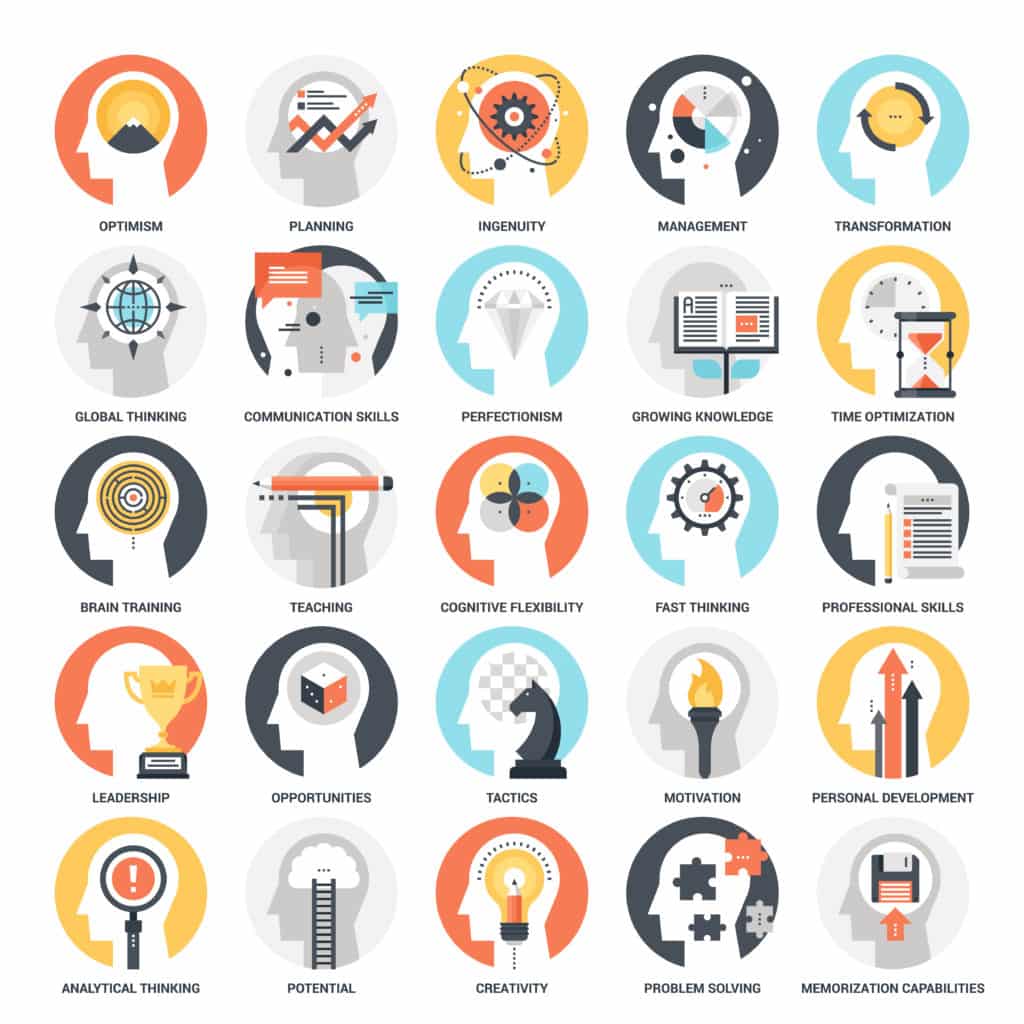Cognitive Skills: Hack Your Mind into Happiness & Fulfillment
Table of Contents
What Are Cognitive Skills?
Cognitive skills are essential your brain’s ability to think, memorize, process, interpret information and in response create a behavior.
They are often suppressed by incorrect thinking and negative beliefs.
What are examples of Cognitive Skills?

Memory allows you to keep a record of events that occurred, knowing how to complete a task or learn a new skill.
Creativity allows us to come up with new ideas, problem solve, and it gives us joy and fulfillment.
Motivation pushes us to do the things we want to do or even things we don’t want to do but are responsible for doing.
Optimism is actually a skill that you can learn if you want to work on being happier. It is the ability for your mind to pull from positive memories or beliefs and fuel your thoughts with those insights.
Attention is your ability to put your thoughts and behaviors into a certain task or thought.
There are many more cognitive skills that cognitive psychologists focus on.
How Do You Train Your Cognitive Skills?
This is where cognitive behavioral therapy or rational emotive behavioral therapy comes in hand.
Cognitive therapy was developed by Aaron Beck who created the Beck-Depression and Beck-Anxiety scales. Cognitive therapy looks at problems we face as being an exaggeration that we have created in our mind, also known as cognitive distortions. Cognitive therapy helps us be more mindful of our unrealistic thoughts and poor behaviors. (Corey, 2021)
So essentially you have to first make yourself aware of what a negative or unhelpful thought is. Then when you hear it you can acknowledge it as being unhelpful and replace it with a more helpful thought.
This helps you be able to reach goals you have in your life that you may not be pursuing to the best of your ability because of these negative beliefs.
How to improve cognitive skills in a child
Children are mostly a blank slate when they are first born, they know some basic skills, but they are so impressionable. They learn feeding after practicing and help from their parents, speaking they learn from hearing the words of others.
If you want to teach your child how to improve their cognitive skills it is wise to teach them we are imperfect and we can give ourselves and others grace. The reason I say this is based on the belief that we “should” be meeting certain expectations. A child “should” be “good” and “listen” to their parents when they go out in public.
However, a child is not a mind reader and does not know what good is and they don’t typically have the best active listening skills.
So instead of holding them to a standard of what they are not, show them how to look at a problem as an opportunity to learn. Encourage them to use their mind and be creative more than learning to just follow rules and obtain societal norms.
Practice things that you believe are important for them to know over and over again. If you want them to remember it better help them focus by using bright colors or a moving object to help them, remember a subject.
How does Cognitive Therapy help?
Cognitive therapy helps you change your perspectives on your abilities and helps you strive for what you truly want. By adding in the behavioral change aspect of cognitive behavioral therapy you are then making changes based on the cognitions you had.
So, let’s first address some unhelpful cognitions that we have that slow down our ability to utilize our cognitive skills to the best of our ability.
For example, if I say “I won’t remember this” then I won’t remember it. This is because I am using a cognitive distortion that is unhelpful to my thinking and it shuts down my memory because I’m telling myself not to remember it.
A more helpful alternative would be to tell myself whatever it is that I’m trying to remember over and over again to help myself remember it and tell myself I will remember it. This takes using my optimism but also believing in myself.
I recommend adding in some positive affirmations to help you solidify your evidence on your cognitive skills. I know they may sound silly to some, however that is how you can work on changing your cognitions and improving them by telling yourself that you are going to improve them.
- A Day and Night Reflection Journal will help you center your day around positive feelings and gratitude. It’s the perfect place to record and celebrate anything that you are grateful for and to preserve important memories.
- Cultivating gratitude is one of the most potent and important mindfulness exercises, and thankfulness has proven to have a positive effect on a person's mental health and general well-being
When the only information available in our minds is from the negative cognitive triad of a negative view of oneself, a negative view of the world and negative view of the future then our brains and body shut down.
We choose not to live up to our fullest potential and we greatly contribute to our feelings of anxiety and depression by allowing that to be the information we pull from when a negative or stressful situation occurs. (Corey, 2021)
References:
Corey, G. (2021). Theory and practice of counseling and psychotherapy. Cengage.
Originally posted 2022-04-20 18:39:30.
Megan Santiago
Latest posts by Megan Santiago (see all)
- How to Find a Trauma Therapist in Tampa - September 30, 2024
- When to Start Tummy Time: Essential Tips for Success! - March 10, 2024
- Best Digestive Enzymes: Food Intolerances & Gut Health Repair - March 10, 2024

